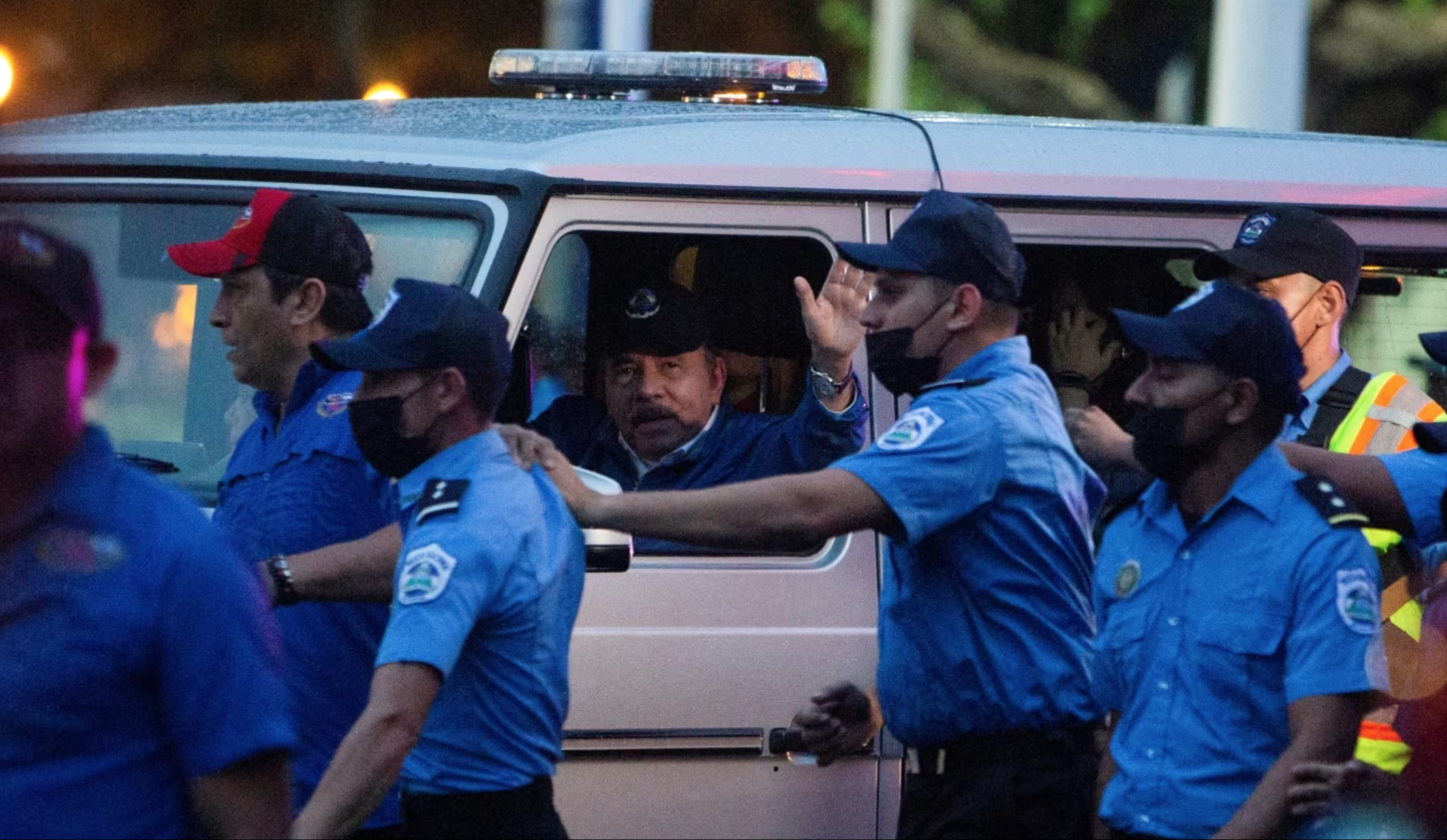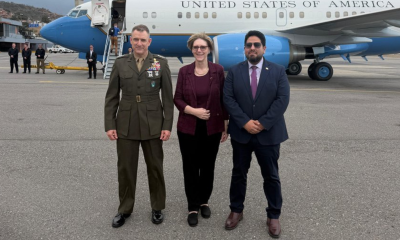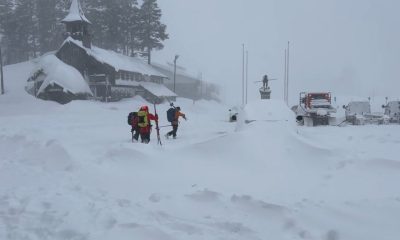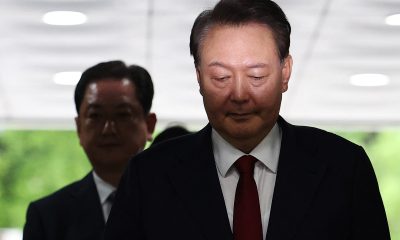Central America
Ortega to declare April 19 as “National Peace Day” in Nicaragua

April 14 |
The government of Daniel Ortega will declare April 19 as “National Day of Peace”, on the fifth anniversary of the beginning of the protests against the president, which were violently repressed, leaving at least 300 dead and thousands of exiled, according to human rights organizations.
Ortega’s wife and also vice-president, Rosario Murillo, announced in the pro-government media that the decree will be issued by the National Assembly in the coming days during a special session and said that with it “they seek to safeguard peace in all its forms”.
“We have decreed this month of April as the month of peace, harmony, tranquility, security, stability and progress against poverty,” said the official who was sanctioned by the United States, which accuses her of having led the repression in Nicaragua in April 2018.
The opposition has scheduled a series of demonstrations next weekend precisely in remembrance of the date. In doing so, they assure that they will demand justice for the victims of state repression in the Central American country.
In Miami, the diaspora announced at least two demonstrations on Sunday, as well as in San José, Costa Rica. In Mexico, Canada and Spain there will also be vigils and concerts alluding to April 2018.
Ortega, who has been in power for more than 15 consecutive years, has branded the protests that erupted in Nicaragua as a coup attempt and has said without evidence that they were sponsored by the United States and the international community.
The president has also launched a crusade against critics and 222 Nicaraguan opponents were banished to the United States and had their citizenship revoked, including seven people who aspired to run in the 2021 presidential elections, which have been labeled as “a farce” by a large part of the international community.
Nicaragua is experiencing its worst political and social crisis in the last 30 years as a consequence of Ortega’s repression. The US has imposed sanctions on a dozen officials close to Ortega for this reason and maintains Nicaragua as “a threat to national security”.
Central America
Washington Imposes Visa Ban on La Modelo Director Amid Crackdown in Nicaragua

The United States government announced Wednesday that it has imposed visa restrictions on Roberto Clemente Guevara Gómez, director of Nicaragua’s largest prison, La Modelo, for his involvement in actions that violate human rights.
In a statement, U.S. Secretary of State Marco Rubio said the measure is intended to promote accountability for abuses committed under what he described as the “Murillo-Ortega dictatorship” against political prisoners.
Rubio specified that Guevara Gómez was designated for participating in “a gross violation of the human rights of a political prisoner.” The sanction was issued under the 2024 Department of State, Foreign Operations, and Related Programs Appropriations Act, which bars the sanctioned individual — and potentially immediate family members — from entering the United States.
“United States demands the immediate and unconditional release of all political prisoners unjustly detained in Nicaragua,” the statement added.
Ongoing tensions between Washington and Managua
Washington rejected Nicaragua’s November 2021 elections, in which President Daniel Ortega and his wife, now co-president Rosario Murillo, were reelected while seven potential challengers were in prison.
Relations between the two countries remain tense amid expanding U.S. sanctions and increasing diplomatic pressure on the Nicaraguan government.
On January 10, marking Ortega’s 19 years in power, Nicaragua released “dozens of detainees,” including political prisoners. The move came one day after the U.S. Embassy in Managua stated that “more than 60 people” remain “unjustly detained or disappeared” in the Central American nation.
U.S. officials have continued to push for the “unconditional release” of political prisoners rather than selective or temporary releases.
Ortega, 80, governs alongside Murillo with consolidated authority, having strengthened executive power through constitutional reforms and security measures, while the opposition has been weakened by imprisonment, exile, and the revocation of citizenship and property rights.
Central America
Guatemala’s Attorney General Consuelo Porras Loses Bid for Constitutional Court Seat

Guatemala’s attorney general, Consuelo Porras, who has been sanctioned by the United States over corruption allegations, lost a key vote on Monday in which a public university selected two of the 10 magistrates for the country’s highest constitutional court. However, she could still seek a seat through another nominating body.
The election of five full magistrates and five alternates to the Corte de Constitucionalidad (CC) is taking place gradually over more than two months and is considered crucial in the ongoing struggle for control of Guatemala’s judiciary, which critics say has long been influenced by a political and economic elite accused of corruption.
According to results announced at a press conference, the governing council of the Universidad de San Carlos de Guatemala (USAC) rejected Porras, who had applied as either a full or alternate magistrate, and instead chose two candidates aligned with the university rector. The vote was held at a hotel in Antigua, about 35 kilometers from the capital.
Despite the setback, Porras — whose term as attorney general ends on May 16 — could still be nominated to the Constitutional Court by the Corte Suprema de Justicia, which appoints two magistrates. The remaining six are selected by the president, the bar association and Congress.
“It’s always a possibility,” the 72-year-old lawyer said days earlier when asked by reporters whether she would seek nomination through another institution if she lost the USAC vote.
Porras has been sanctioned by Washington and the European Union for allegedly attempting two years ago to block the inauguration of President Bernardo Arévalo and for pursuing legal actions against anti-corruption prosecutors, judges, journalists and social leaders since taking office in 2018.
The USAC vote was controversial because most members of the university’s governing council are serving beyond the expiration of their terms. Students, academics and social activists staged protests against Porras’ candidacy.
Central America
Teens visit ETESAL substation to learn about responsible energy use

Within the framework of World Energy Day, teenagers from the institutional care center Ciudad Niñez y Adolescencia (CNA), run by the Consejo Nacional de la Primera Infancia, Niñez y Adolescencia (Conapina), took part in an educational visit to a substation operated by Empresa Transmisora de El Salvador (ETESAL) in Santa Ana.
The aim of the activity was to give participants first-hand knowledge of how the country’s electricity transmission system works and to highlight the importance of responsible energy use.
During the tour, the group learned about the process that delivers electricity to homes, businesses, and industries. They were also introduced to specialized technical equipment and the safety measures required to ensure an efficient and reliable service.
Before the guided visit, the teenagers attended two informative talks and an environmental awareness session focused on the relevance of responsible energy consumption and its impact on the environment.
According to Nelson Menjívar, head of Conapina’s programs unit, the initiative serves a dual purpose. “It has two objectives: a recreational component and an educational one, so that adolescents can learn about the work carried out by ETESAL and how some of the resources they use at home are generated. This is in keeping with the guarantees established under the Crecer Juntos law; we ensure those rights for children,” he said.
Menjívar stressed that these activities help young people better understand how essential services function in their daily lives while promoting efficient consumption habits and a culture of environmental respect and care.
The event is part of the principle of shared responsibility set out in the Crecer Juntos law, promoted by the administration of Nayib Bukele, which states that families, society, private companies, and the State must work together to safeguard the comprehensive well-being of children and adolescents.
-

 International4 days ago
International4 days agoTop U.S. Military Commander Meets Interim Venezuelan Leaders After Maduro’s Capture
-

 International2 days ago
International2 days agoTrump Defies Supreme Court With New 10% Global Tariff
-

 International3 days ago
International3 days agoThree Injured in Mail Package Explosion at Buenos Aires Gendarmerie Academy
-

 International3 days ago
International3 days agoU.S. Targets Members of Outgoing Boric Administration With Visa Revocations
-

 International2 days ago
International2 days agoNinth Victim Recovered After Deadliest U.S. Avalanche in Decades
-

 Sin categoría4 days ago
Sin categoría4 days agoFormer South Korean President Yoon Suk-yeol Sentenced to Life for Insurrection
-

 International6 hours ago
International6 hours agoOver 40 Million Affected by Major Snowstorm in Northeastern U.S.
-

 International6 hours ago
International6 hours agoNine People Killed in Two Armed Attacks in Manabí, Ecuador


























